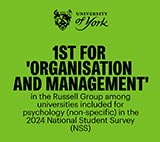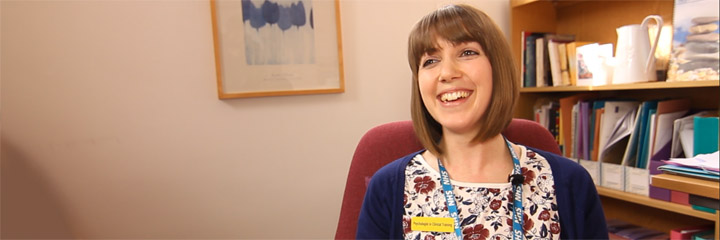
Routes to Clinical Psychology

Many of our students aspire to careers in Clinical Psychology because they want to improve the well-being of adults and children who have mental, emotional, or behavioural, disorders. There are two routes into Clinical Psychology in the UK after graduating from York. One is an exceptional Fast-track Route which we offer in partnership with the University of Hull. The other is a Conventional Route. Graduates from Psychology at York have developed successful careers in Clinical Psychology through both routes.
Fast-track Route into Clinical Psychology
The BSc and MSci Programmes in Psychology at the Universities of York and Hull are integrated with the Doctorate in Clinical Psychology which is offered at the University of Hull. Approximately 13 graduates from York are able to enter this doctoral programme each year immediately on graduating. This route into training in clinical psychology is unique and represents a special opportunity for psychologists in York and Hull.
To gain a place on the doctoral programme, students in York need first to be accepted into our Year-3 specialist modules which provide training in the theory and practice of clinical psychology. Entry into these modules is restricted to 90 students each year. Applications from Year-2 students are assessed by a panel of clinical psychologists. Preference is given to those with the strongest applications overall, taking into account evidence of experience relevant to clinical psychology, the quality of a personal statement, and Year-1 marks.
Students wishing to be short-listed as candidates for the doctoral programme in Hull need to perform well on the Year-3 specialist modules. Selection for entry into the doctoral programme is then determined by academic achievements, references, and an evaluation of applicants’ relevant experience and understanding of clinical psychology in interviews.
The University of Hull's website has more information about their Doctorate in Clinical Psychology and their Faculty of Health Sciences which delivers the Clinical Doctorate.
Conventional Route into Clinical Psychology
The Conventional Route into clinical psychology involves three stages. First, a student needs to obtain a good degree (usually a first or a good upper second) in a course in Psychology which has been accredited by the British Psychological Society (BPS) as providing the Graduate Basis for Registration. Second, as a graduate they need to obtain experience working or volunteering in clinical-psychology settings, typically as an assistant psychologist. It is not unusual for graduates to spend two years in such roles. Some graduates also obtain masters level qualifications relevant to clinical psychology. Then, typically two or three years after first graduating, they apply through the Clearing House for Postgraduate Courses in Clinical Psychology for entry into a doctoral programme in clinical psychology at a UK university.
You can learn more about Clinical Psychology and the Conventional Route to Clinical Psychology careers in the UK Health Service at the BPS Website, and for more informal self-help from other aspiring Clinical Psychologists on specialist internet forums such as ClinPsy.
Choice of route?
Both routes are available to all entrants, but different options apply to those who choose the 3-year BSc or 4-year MSci programmes at the end of year 2.
The Fast-track route provides the opportunity to start studying for a qualification as a Clinical Psychologist in Hull immediately on graduating with a bachelor’s degree. Currently, to follow this route, York undergraduates must complete the 3-year BSc Programme and must take the Year-3 specialist modules in Clinical Psychology.
The Conventional route leads to a wider range of choices of where to study Clinical Psychology. There are also more pathways into the Conventional route because York undergraduates may take it after completing either the 3-year BSc or the 4-year MSci. BSc and MSci students considering the conventional route are advised to seek to enrol in the specialist modules in Clinical Psychology during their third year.
